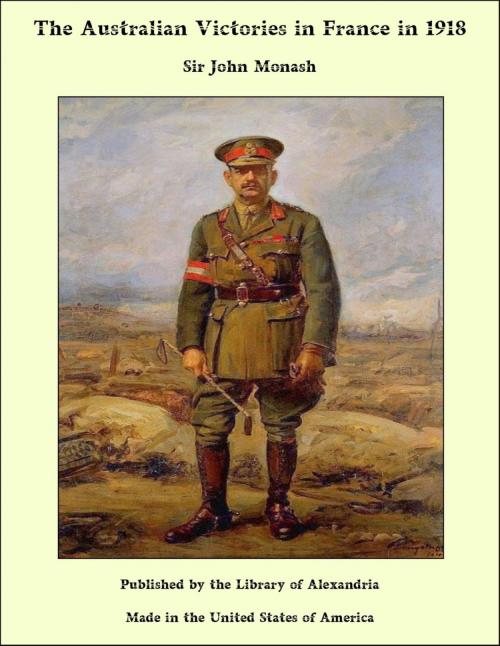The Australian Victories in France in 1918
Nonfiction, Religion & Spirituality, New Age, History, Fiction & Literature| Author: | Sir John Monash | ISBN: | 9781465611000 |
| Publisher: | Library of Alexandria | Publication: | March 8, 2015 |
| Imprint: | Language: | English |
| Author: | Sir John Monash |
| ISBN: | 9781465611000 |
| Publisher: | Library of Alexandria |
| Publication: | March 8, 2015 |
| Imprint: | |
| Language: | English |
The renown of the Australians as individual fighters, in all theatres of the Great War, has loomed large in the minds and imagination of the people of the Empire. Many stories of the work they did have been published in the daily Press and in book form. But it is seldom that any appreciation can be discovered of the fact that the Australians in France gradually became, as the war progressed, moulded into a single, complete and fully organized Army Corps. Seldom has any stress been laid upon the fact that because it thus became a formation fixed and stable in composition, fighting under a single command, and provided with all accessory arms and services, the Corps was able successfully to undertake fighting operations on the grandest scale. There can be little question, however, that it was this development which constituted the paramount and precedent condition for the brilliant successes achieved by these splendid troops during the summer and autumn of 1918—successes which far overshadowed those of any earlier period of the war. For a complete understanding of all the factors which contributed to those successes, and for an intelligent grasp of the course of events following so dramatically upon the outbreak of the great German offensive of March 21st of that year, I propose to trace, very briefly, the genesis and ultimate development of the Corps, as it became constituted when, on August 8th, it was launched upon its great enterprise of opening, in close collaboration with the Army Corps of its sister Dominion of Canada, that remarkable counter-offensive, which it maintained, without pause, without check, and without reverse, for sixty consecutive days—a period full of glorious achievement—which contributed, as I shall show in these pages, in the most direct and decisive manner, to the final collapse and surrender of the enemy. In the days before the war, there was in the British Service no recognized or authorized organization known as an Army Corps. When the Expeditionary Force was launched into the conflict in 1914, the Army Corps organization was hastily improvised, and consisted at first merely of an Army Corps Staff, with a small allotment of special Corps Troops and services, and of a fluctuating number of Divisions.
The renown of the Australians as individual fighters, in all theatres of the Great War, has loomed large in the minds and imagination of the people of the Empire. Many stories of the work they did have been published in the daily Press and in book form. But it is seldom that any appreciation can be discovered of the fact that the Australians in France gradually became, as the war progressed, moulded into a single, complete and fully organized Army Corps. Seldom has any stress been laid upon the fact that because it thus became a formation fixed and stable in composition, fighting under a single command, and provided with all accessory arms and services, the Corps was able successfully to undertake fighting operations on the grandest scale. There can be little question, however, that it was this development which constituted the paramount and precedent condition for the brilliant successes achieved by these splendid troops during the summer and autumn of 1918—successes which far overshadowed those of any earlier period of the war. For a complete understanding of all the factors which contributed to those successes, and for an intelligent grasp of the course of events following so dramatically upon the outbreak of the great German offensive of March 21st of that year, I propose to trace, very briefly, the genesis and ultimate development of the Corps, as it became constituted when, on August 8th, it was launched upon its great enterprise of opening, in close collaboration with the Army Corps of its sister Dominion of Canada, that remarkable counter-offensive, which it maintained, without pause, without check, and without reverse, for sixty consecutive days—a period full of glorious achievement—which contributed, as I shall show in these pages, in the most direct and decisive manner, to the final collapse and surrender of the enemy. In the days before the war, there was in the British Service no recognized or authorized organization known as an Army Corps. When the Expeditionary Force was launched into the conflict in 1914, the Army Corps organization was hastily improvised, and consisted at first merely of an Army Corps Staff, with a small allotment of special Corps Troops and services, and of a fluctuating number of Divisions.















